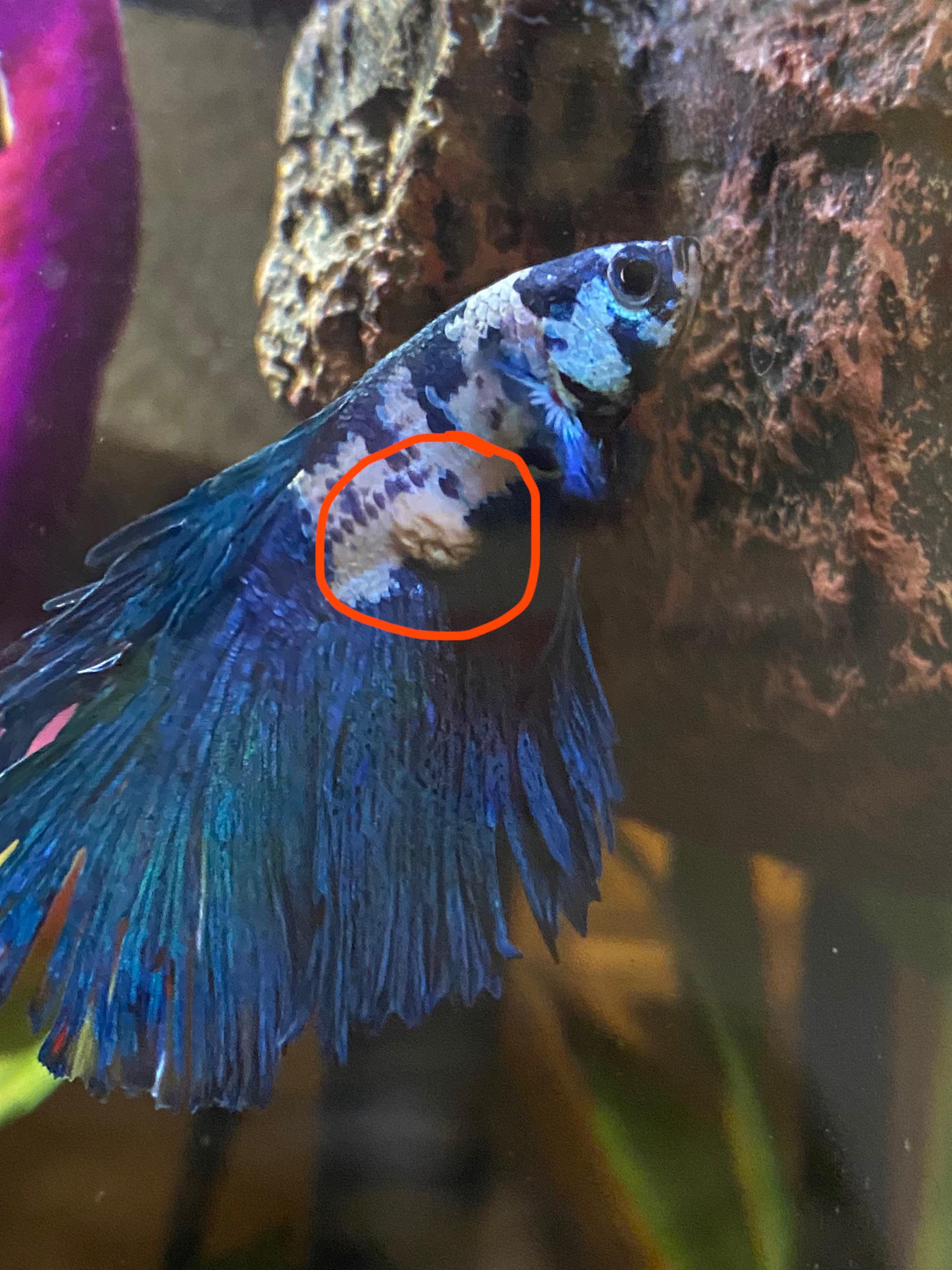Betta Fish Tumor

Betta fish tumor. Credit: reddit
Identifying a Tumor in Your Betta
Click here for the betta fish care guide ebook
Betta fish are loved for their stunning colors, graceful fins, and energetic nature, making them a favorite among aquarium enthusiasts. So, it’s natural to feel worried if you notice a lump or tumor-like growth on your betta.
The reassuring news is that not all tumors are harmful, and with the right care, many can be treated or managed. This guide will help you understand betta fish tumors, recognize the signs, and provide practical tips for treatment and prevention.
- Benign (non-cancerous): These are more common and typically don’t spread.
- Malignant (cancerous): Rare in bettas but potentially more harmful as they can invade tissues.
While tumors are often linked to genetics or aging, other factors, such as water quality and diet, can play a role.
Symptoms of Tumors in Betta Fish
Knowing the symptoms of tumors can help you act quickly:
- Visible Lumps: Tumors can vary in size, from small bumps to large growths.
- Discoloration: The lump may appear red, white, or darker than the surrounding tissue.
- Changes in Swimming Behavior: Difficulty swimming or balance issues.
- Lethargy: Decreased activity and prolonged resting at the bottom of the tank.
- Loss of Appetite: Refusing food or eating less than usual.
- Breathing Difficulty: Gasping at the surface or rapid gill movement.
If you observe any of these symptoms, consult a veterinarian specializing in fish care for a diagnosis.
Causes of Tumors in Betta Fish
Tumors can result from a variety of factors, including:
- Genetic Predisposition
- Some bettas are more prone to tumors due to their breeding lineage.
- Poor Water Quality
- High ammonia, nitrite, or nitrate levels stress your betta, weakening their immune system.
- Low-Quality Diet
- Nutritional deficiencies can increase the risk of tumor development.
- Infections
- Bacterial or fungal infections may cause abscesses or growths that resemble tumors.
- Aging
- Older bettas are more likely to develop tumors due to natural cell mutations.
Not All Lumps Are Tumors
Before assuming a lump is a tumor, consider these possibilities:
| Condition | Description | Treatment |
|---|---|---|
| Abscess | A localized infection that appears as a white lump. | Clean water, antibacterial medication. |
| Fungal Infection | Cotton-like growth on the body. | Antifungal treatments like methylene blue. |
| Ulcers | Red, inflamed sores caused by infections or injuries. | Water quality improvement, antibacterial medication. |
| Dropsy | Bloating due to kidney failure, often with pinecone-like scales. | Epsom salt baths, antibacterial treatment, and supportive care. |
| Swim Bladder Disease | Caused by constipation, injury, or infection; affects buoyancy. | Fasting, feeding deshelled peas, or using medications for underlying infections. |
| Parasites | Lumps caused by parasites like velvet or columnaris. | Antiparasitic medication. |
How to Treat Tumors in Betta Fish
Isolate the Fish
Move your betta to a quarantine tank to reduce stress and prevent potential spread of infection.
Check Water Parameters
Ensure the water is pristine. Ideal parameters for bettas are:
- pH: 6.5–7.5
- Ammonia: 0 ppm
- Nitrite: 0 ppm
- Nitrate: Less than 20 ppm
- Temperature: 78–80°F
Use Medication (If Necessary)
Depending on the type of tumor, you may need:
- Antibacterial treatments for abscesses or ulcers.
- Antifungal medications for fungal growths.
- Aquarium salt to support general healing.
Maintain a Stress-Free Environment
Provide plenty of hiding spots and avoid sudden changes to their tank setup.
Preventing Tumors in Betta Fish
Prevention is key to your betta’s health:
- Feed High-Quality Food: Choose nutritionally balanced betta pellets and supplement with live or frozen treats.
- Ensure Clean Water: Perform weekly water changes and use a reliable filter.
- Quarantine New Fish: Avoid introducing pathogens by isolating new fish before adding them to the tank.
- Avoid Stressors: Provide a stable, enriched environment with hiding spots and gentle water flow.
When to Consider Euthanasia
If your betta’s tumor becomes untreatable and they show signs of severe discomfort, euthanasia may be the kindest option. Use clove oil as a humane method to minimize suffering.
